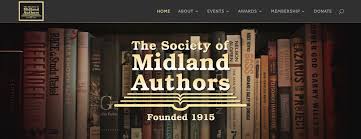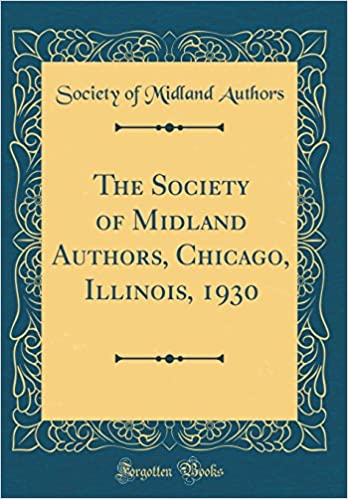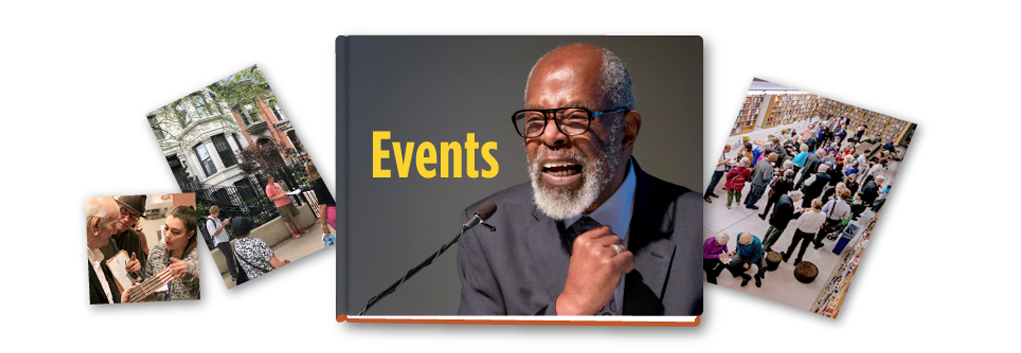Society of Midland Authors (SMA) Marks 107th Year in Chicago
Sunday, April 3, 2022
 April of this year, 2022, marks the 107th anniversary of the Chicago-based Society of Midland Authors, a lively group that still flourishes with nearly 400 paid members representing book authors in 12 States of the American Midland. SMA conducts monthly meetings and literary programs, normally at the Cliff Dwellers’ Club, high above the Art Institute, overlooking Grant Park and Lake Michigan. More recently, because of COVID, SMA’s Zoom meetings and programs, conducted the first Tuesday of each month, reach anyone with a computer. Sometimes, SMA teams up to co-sponsor programs at the Harold Washington Library. SMA also posts and sends out an information-packed monthly newsletter, Literary License, about its member authors and literary events. The venerable group also hosts an annual best books-of-the-year by Midland authors awards, and a ceremony and Annual Banquet in May to present those awards, also open to the public.
April of this year, 2022, marks the 107th anniversary of the Chicago-based Society of Midland Authors, a lively group that still flourishes with nearly 400 paid members representing book authors in 12 States of the American Midland. SMA conducts monthly meetings and literary programs, normally at the Cliff Dwellers’ Club, high above the Art Institute, overlooking Grant Park and Lake Michigan. More recently, because of COVID, SMA’s Zoom meetings and programs, conducted the first Tuesday of each month, reach anyone with a computer. Sometimes, SMA teams up to co-sponsor programs at the Harold Washington Library. SMA also posts and sends out an information-packed monthly newsletter, Literary License, about its member authors and literary events. The venerable group also hosts an annual best books-of-the-year by Midland authors awards, and a ceremony and Annual Banquet in May to present those awards, also open to the public.
By 1915, the year the Midland Authors first officially gathered, Chicago had grown in less than 80 years from a few hundred pioneer residents with a couple of frontier poets and journalists to a great and sophisticated metropolis on its way to two million inhabitants. Chicago was ready for an organization that brought its many book authors into social contact with one another on a regular basis. John M. Stahl, publisher of Illinois Farmer and author of Growing With The West, is credited with the initial idea of the Society of Midland Authors. He invited others to join him as founders including future Pulitzer Prize winners Hamlin Garland, author of Main-Traveled Roads and Son of the Middle Border (Garland also named the Cliff Dwellers’ Club after Henry Blake Fuller’s 1893 novel of that name); Edna Ferber, future author of Show Boat and Pulitzer winner So Big; as well as Harriet Monroe, founder of Poetry: A Magazine of Verse. Monroe became SMA’s eighth president and was known as “a force as a director for years.”
These founding luminaries were joined by famed defense attorney Clarence Darrow, author of the novel Farmingham; popular performance poets James Whitcomb Riley, “America’s Best Loved Poet” from Indiana, and author of “Little Orphant Annie;” and Vachel Lindsay, “The Prairie Troubadour” from downstate Springfield, who traveled across the nation with empty pockets as he hawked his pamphlet, Rhymes To Be Traded For Bread. Other founders included Chicago newsman and future New York playwright George Ade, popular for his newspaper column and book Fables in Slang; historical fiction author Mary Hastings Bradley, who wrote The Palace of Broken Windows; William Allen White, famed Kansas editor of the Emporia Gazette, a “spokesman for middle America.”
Whitcomb Riley, “America’s Best Loved Poet” from Indiana, and author of “Little Orphant Annie;” and Vachel Lindsay, “The Prairie Troubadour” from downstate Springfield, who traveled across the nation with empty pockets as he hawked his pamphlet, Rhymes To Be Traded For Bread. Other founders included Chicago newsman and future New York playwright George Ade, popular for his newspaper column and book Fables in Slang; historical fiction author Mary Hastings Bradley, who wrote The Palace of Broken Windows; William Allen White, famed Kansas editor of the Emporia Gazette, a “spokesman for middle America.”
The original 52 founders first gathered for a dinner at the Auditorium Hotel on November 28, 1914. “Feelings ran high about the constant drain of talent which New York was taking from us,” wrote experimental actress of The Little Theatre and playwright, Alice Gerstenberg, SMA’s sixth president. “It was thought that some gathering of home writers could promote mutual inspiration and a bond for remaining.”
The group met again December 9, 1914, when Hamlin Garland argued that they should be expanded to include writers of the entire Midlands. His fellow writers “became so fired up by Mr. Garland’s enthusiasm that we resolved ourselves into a Society of Midland Authors, pledged to recruit our ranks to full war strength from those of our fellow craftsmen in 11 other states of the Union," said SMA’s first president Hobart Chatfield Chatfield Taylor, author of several novels and a biography of Moliere. Thus, SMA’s membership was expanded to include 12 states: Illinois, Indiana, Iowa, Kansas, Michigan, Minnesota, Missouri, Nebraska, North Dakota, Ohio, South Dakota, and Wisconsin.
A constitution was drawn up, one which SMA still uses today. It extended membership to "any writer resident within the 12 states who is the author of a book of poetry, fiction, history, biography or criticism, published in the regular course of trade, or who is the author of a play produced by professional players on a public stage." Over the years that definition expanded to mean anyone who at some point resided in the Midlands. And with the transformation of publishing, anyone who has written a book of agreed-upon quality no matter how it was published or distributed can be nominated for membership. SMA also has had a strong contingent of children’s book authors, and associate members who are publishers, editors, teachers, and librarians.
 The organizing committee also stated that SMA’s mission included "a stimulation of creative literary effort and the establishment of a library of books and manuscripts" by member authors. At one point the Society maintained dedicated meeting rooms with their own libraries in various Chicago hotels, such as the Sherman House across from City Hall where today’s State of Illinois building stands. These days, SMA’s archive and collection of books, including those of Award winners, can be found in the Special Collections of the Richard J. Daley Library at the University of Illinois Chicago.
The organizing committee also stated that SMA’s mission included "a stimulation of creative literary effort and the establishment of a library of books and manuscripts" by member authors. At one point the Society maintained dedicated meeting rooms with their own libraries in various Chicago hotels, such as the Sherman House across from City Hall where today’s State of Illinois building stands. These days, SMA’s archive and collection of books, including those of Award winners, can be found in the Special Collections of the Richard J. Daley Library at the University of Illinois Chicago.
The Society of Midland Authors was formally launched in Club Room No. 1 of the Auditorium Hotel on April 24, 1915, at 3:25 P.M. That night, it gave its first banquet in the hotel. Hamlin Garland, who had recently relocated to New York despite his literary celebration of the Midwest, returned to address the new Society. Among other things, he claimed, "Practically all of the stuff written in recent years, which can classify as literature, has been dripped or pounded out up in these old states of Illinois, Kansas, the Dakotas, Michigan, Ohio, and Indiana. The stuff is printed in New York, but that is all," obviously an over-indulgent boast, but partially true.
In addition to those already mentioned, SMA soon welcomed to it ranks Zona Gale of Wisconsin, author of Friendship Village and Miss Lulu Bett, whose stage adaptation won her a Pulitzer Prize; poet Arthur Davison Ficke of Iowa, a best friend of literary editor and future novelist Floyd Dell and future flame of Edna St. Vincent Millay; Eunice Tietjens, associate editor of Poetry; William Morton Payne, literary critic for the high-brow Dial; Howard Vincent O’Brien, Chicago Daily News columnist and author of Wine, Women and War; and Alice French, a popular Iowa novelist writing under the name of Octave Thanet.
New members also included playwright Kenneth Sawyer Goodman, who perished in the “Great War,” but whose name lives on in Chicago Theatre, and Maurice Browne, creator in 1912 of Chicago’s Little Theater in the Fine Arts Building, before he moved back to a successful career in London theatre. Jane Addams, author of Twenty Years at Hull House; Edgar Lee Masters, author of Spoon River Anthology, for decades the best-selling book of poetry in the nation; and the great Chicago sculptor Lorado Taft, author of The History of American Sculpture soon joined.
Other early members included Brand Whitlock, a former Chicago journalist, attorney, and mayor of Toledo, Ohio; Gene Stratton-Porter, Hoosier author of the best-selling A Girl of the Limberlost; Louis Brumfield from Ohio who won a Pulitzer for his novel Early Autumn; George Barr McCutchen, best-selling Hoosier author of Brewster's Millions (later made into an Eddie Murphy movie); and his brother John, beloved Chicago Tribune cartoonist; philosopher Paul Carus, author of The Gospel of Buddha; Ring Lardner, Saturday Evening Post famed short story writer and author of the popular baseball saga, You Know Me Al; and Sherwood Anderson author of America’s first important Freudian literary work, Winesburg, Ohio.
Midland Authors met for regular luncheons and dinners with talks by local and visiting authors, and its Annual Banquet, an ongoing SMA tradition. SMA’s first official annual meeting was at the Caxton Club in the Auditorium Building on October 30, 1915, followed by a tea, and a banquet at the Congress Hotel, addressed by popular authors Iowan Alice French ("The Bishop's Vagabond"); Hoosier Meredith Nicholson (The House Of A Thousand Candles); and Illinois authors Emerson Hough (Mother of Gold) and Randall Parish (When Wilderness Was King). At the dinner, formality was “thrown to the four winds and good fellowship reign[ed],” as it has for over 100 years.
In 1917, the U.S. entered the first World War, and SMA members were among the troops sent to Europe. “We held our meetings, and good ones, live ones; but all the time our gaiety was forced,” reported Emerson Hough, SMA’s second president. The next year, the Annual Banquet was cancelled due to the worldwide influenza pandemic, an interruption that unfortunately was repeated in 2020 and 2021.
Writing in the London Nation in 1920, as many know, H. L. Mencken called Chicago “the literary capital of America….The most important writing of recent years had …come from the big city in the middle of America's heartland," Mencken cited as examples two SMA members, Sherwood Anderson for Winesburg, Ohio, and Edgar Lee Masters for Spoon River Anthology. He also noted the influence of Harriet Monroe's Poetry magazine, Maurice Browne's Little Theatre, and Chicago's book critics, SMA members among them. "In Chicago there is the mysterious something that makes for individuality, personality, charm …” Mencken correctly observed.
Some SMA records are sketchy, but during the 1920s its meetings were headlined by Sherwood Anderson, Carl Sandburg, and visiting poet Edna St. Vincent Millay, still considered scandalous for burning her candles “at both ends.” In May 1921, SMA gave a banquet at the Cordon Club to honor Jane Addams, who was on her way to a peace conference in Europe. (She won the Nobel Peace Prize in 1931.)
SMA presidents during the 1920s included Douglas Malloch, the “Lumberman’s Poet;” Edgar J. Goodspeed, who wrote more than 50 books and served as president from 1929 to 1930. He was followed by Howard Vincent O'Brien and Margaret Ayer Barnes, author of a generational novel Years of Grace that won the Pulitzer Prize in 1931. It was partially set in a mansion on Pine Street, later renamed North Michigan Avenue after the bridge over the river opened in 1920. Barnes’ sister, Janet Ayer Fairbank, a Pulitzer Prize runner-up, was also a SMA member.
Barnes’ presidency was followed by Vincent Starrett, author of Born in a Bookshop and The Private Life of Sherlock Holmes, and William Montgomery McGovern author of To Lhasa in Disguise: A Secret Expedition Through Mysterious Tibet. They were succeeded by Franklin J. Meine, a folklorist and Mark Twain expert; Martin D. Stevers (Sea Lanes: Man's Conquest of the Ocean); and Arthur Meeker (Prairie Avenue, among others).
Notable authors who joined SMA during the 1930s include Minnesotan Ole Edvart Rolvaag, author of Giants in the Earth; Mignon G. Eberhart, also known as "America's Agatha Christie;" and Frank O. King who created the Gasoline Alley comic strip, which appeared in 300 newspapers and drew 27 million readers. Harry Hansen, editor of the Chicago Daily News and future literary editor of the New York World, the O. Henry Prize Stories, and author of Adventures of the Fourteen Points about Woodrow Wilson’s heroic but failed crusade, was invited to join; as well as Pulitzer Prize winner George Dillon, who edited Poetry magazine.
Chicago Tribune reporter and book critic Fanny Butcher became a member in the 1930s and was active for decades. In 1974, she was given SMA’s Patron Saint Award. Nelson Algren said of Butcher, "Friendship never seduced her into praising what was un-praise worthy, and personal dislike didn't provoke her into letting blood." Among others, Butcher recruited a U.S. Senator from Michigan, Arthur Vandenberg, who wrote a biography of Alexander Hamilton. Butcher noted he was “delighted and honored” to join.
Another 1930s member was University of Chicago physicist Albert A. Michelson, who won a Nobel Prize in Physics for the Michelson/Morley Experiment that measured the speed of light. Clarence Darrow made the keynote speech at the 1935 annual dinner and “gave our minds much to think of and our souls much to sorrow over," reported the SMA newsletter.
SMA presidents of the 1940s included Mary Hastings Bradley, who served as a foreign correspondent for Collier’s Magazine. At one SMA luncheon, “She made the blood run cold in her listeners by her picture of the…[German] concentration camps,” Fanny Butcher told her Chicago Tribune readers about Bradley’s descriptions of Buchenwald. Guest speakers at other SMA luncheons and dinners included Ethel Waters, speaking about her memoir His Eye is on the Sparrow.
SMA continued its activities during the next eight decades. Marquee members included proletarian writer Jack Conroy, editor of The Anvil, who wrote Anyplace But Here with Arna Bontemps; Willard Motley (known to Chicago Defender readers as Bud Billiken), author of Knock on Any Door, a tragic naturalistic novel made into a major movie with Humphrey Bogart; Nelson Algren (Man with the Golden Arm, a National Book Award winner made into a movie with Frank Sinatra); Lloyd Wendt (an SMA president) and Herman Kogan for their book Lords of the Levee. (Herman’s multi-talented son Rick of the Chicago Tribune is a current member.) Gwendolyn Brooks, who won a Pulitzer for Annie Allen and S. I. Hayakawa, a future California U.S. Senator and author of Language in Action; were also active in the group.
Other well-known members included Peter De Vries, who after his Chicago days as editor of Poetry, became a regular writer at the New Yorker and author of 23 novels; John G. Neihardt, who wrote Black Elk Speaks; Saul Alinsky, who stirred things up with Rules for Radicals; arch-conservative Robert R. McCormick, publisher of the Chicago Tribune; science/fantasy icon Fritz Leiber, Jr.; and Van Allen Bradley, literary editor of the Chicago Daily News, also an SMA president.
Bruce Canton, who won a Pulitzer Prize for his Civil War books; former President Herbert Hoover from Iowa, author of The Ordeal of Woodrow Wilson and Freedom Betrayed; Studs Terkel, author of Division Street: America; and Carl Sandburg, who won a couple of Pulitzer Prizes, were esteemed members. Also in the 1950s, comic actor Jerry Lewis delivered a serious SMA speech about juvenile delinquency.
In April 1965, Mayor Richard J. Daley posed for photos with future Nobel Laureate Saul Bellow, who won that year’s SMA Fiction Award for Herzog, Gwendolyn Brooks, and Harry Mark Petrakis, winner of four SMA awards, to declare April 24, “Society of Midland Authors Day.” His son, Richard M. Daley made the same declaration on SMA’s 90th birthday in 2005.
More recent SMA presidents included Leon Forrest, author of Divine Days, sometimes called “Chicago’s Ulysses” and Bernard J. Brommel, author of Eugene V. Debs: Spokesman for Labor and Socialism. Lila and Arthur Weinberg, authors of The New York Times best-seller Attorney for the Damned about Clarence Darrow, served two separate two-year presidential terms. Richard Frisbie, and his son Tom, an editor at the Sun-Times and co-author of Victims of Justice, both served as presidents and for years as dedicated and expert editors of Literary License.
Other recent presidents included Dempsey J. Travis, author of An Autobiography of Black Chicago; Jim Bowman, author of Company Man: My Jesuit Life; poet Phyllis Ford Choyke, co-founder of Harper Square Press; award-winning children's book author Stella Pevsner; James Schwab, a global disaster relief specialist and author of Raising Less Corn and More Hell; Chicago historian Richard Lindberg, author of 20 books on crime, sports, culture; Carol Carlson, co-author of Yesterday and Today: Chicago, with Lindberg; James Merriner, author of Grafters and Goo Goos: Corruption and Reform in Chicago; Robert Loerzel, SMA’s historian (see A Century of Winged Words: SMA 1915-2015 for a more detailed history) and author of Alchemy of Bones; Meg Tebo, author of Shakespeare for Lawyers; and Dick Simpson, former Chicago Alderman, UIC political science professor, and author of numerous books on political corruption and reform; and others who have volunteered their time for a two-year term to help maintain this large organization and cultural treasure, and steer its many activities.
SMA’s current president is Gerard Plecki, author of Singing in the Rain: The Definitive Story of Woodstock at 50. Recent high-profile SMA author members include Haki Madhubuti, author of Black Men; Syed Haider, Life of Ganish and founding editor of the internationally-recognized Chicago Quarterly Review; Iowan Dow Mossman, author The Stones of Summer; Scott Turow (Presumed Innocent); Kevin Davis (Defending the Damned); Stuart Dybek (The Coast of Chicago); Dominic Pacyga (Polish Chicago); Alton Miller (Harold Washington); absurdist playwright Bill Lederer, with 30 produced plays and whose uncle was the real model for Studs Lonigan; Ray Boomhower (Mr. President: A Life of Benjamin Harrison); Rick Perlstein (Reaganland); Johnathan Eig (Get Capone); Rex Huppke, Chicago Tribune wit who served as masters of ceremony for a recent SMA Annual Banquet; Edward "Ted" McClelland (Horseplayers); Joe Meno (Chicago Noir); June Sawyers (Celtic Music); Michael Raleigh (Death in Uptown); Christine Sneed (Paris, He Said); Sharon Solwitz (Bloody Mary); Claude Walker (Drone Dogs); Greg Borzo (Lost Restaurants of Chicago); and many others.
For over a century, scores and scores of talented, hard-working, often isolated authors from 12 states have joined SMA to participate in its collegial activities, monthly gatherings, awards program, banquets, and prestige. That is why after 107 years, the Society of Midland Authors continues to make its literary and programmatic presence felt in the American Midland capital of Chicago.
R. Craig Sautter received a MA in Philosophy from the University of Wisconsin Madison and is a poet, short story writer, editor, and publisher. He is the author, co-author, or editor of 11 books. He was also a gubernatorial appointee to the Abraham Lincoln Presidential Library Advisory Board. He creates television and radio campaigns for political candidates. Since 1981, he has taught courses in philosophy, politics, history, literature, and creative writing at DePaul, and been awarded several teaching awards. He was SMA’s 47th president.








